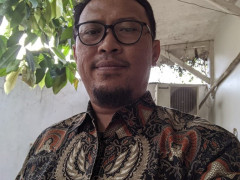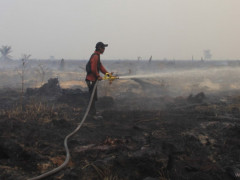Food Estate: Reopening the Peatland due to the Pandemic
By Dimas N. HartonoTurn on the Alarm, Deforestation Increases
It seems that the current regime only brought up the issue of climate change as a sweetener in discussions, which sounded loud, but was not implemented in national strategic policies and programs.
The development of the Special Economic Zone (SEZ) has cost thousands of hectares of the Sembilang National Park, which extends into the waters of the Bangka Strait. This SEZ was developed to accommodate industrial activities, exports, imports, and other activities that have high economic value and international competitiveness, on an area of approximately 4,044.59 hectares.
And if you look at the SEZ development master plan, it doesn't just threaten the mainland. It also threatens the water ecosystem. The government carried out land acquisition to facilitate the development of an industrial port which is divided into two zones, i.e. 2,029.48 hectares of land zone and 2,201.84 hectares of reclamation zone in Tanjung Carat, Banyuasin District, South Sumatra.
Analysis of the SEZ map showed that this project will threaten the Sembilang National Park. The national park has an area of about 2,051 sq km, including peat swamp forest, freshwater swamp forest, and riparian forest. Between September to November, thousands of migratory birds from Siberia, Russia come to the Sembilang National Park. If this SEZ is built, it will have an impact on the mangrove forest ecosystem, which will also have an impact on the migratory birds.
The change in the status from forest area to a non-forest area or area for other uses (APL) has started to have an impact, such as the submergence of one of the resident’s houses in Sungsang II Village during the west wind season in the last 2 years. The sea level has increased by approximately 4 meters.
Community Vulnerabilities
Building an SEZ and its supporting facilities requires land acquisition. Some of the lands are coconut plantations and mixed plantations owned by the community. Assuming that each farmer owns 2 hectares of land on average and the land to be acquired in Tanjung Api-api is 2,300 hectares, then 1,150 farmers and fishermen will lose their livelihoods, not counting the other areas affected by the development in Tanjung Api-api.
This will also be a threat and a potential trigger for land conflicts.
The Indonesian Forum for the Environment (WALHI) South Sumatra noted that in 2020, there were approximately 20 agrarian conflicts in South Sumatra due to evictions, changes in the landscape, and the granting of new HTI and oil palm plantation permits.
Besides agrarian conflicts, the massive corporate territory in South Sumatra has also caused other problems. There have been at least 20 cases of tigers attacking humans in Pagaralam, Lahat, Empat Lawang, Muara Enim, Musi Rawas Utara, Musi Banyuasin, and Ogan Komering Ulu due to the expansion of mining industry, plantations, and geothermal exploitation in these areas.
Then there were six cases of crocodiles attacking humans in Sungsang IV Village, Banyuasin II Subdistrict, Banyuasin District, due to the massive land clearing based on the Coastal and Small Islands Zoning Plan (RZWP-3-K), and five cases of elephants attacking humans in Air Sugihan Subdistrict, Ogan Komering Ilir District due to the expansion of oil palm plantations.
Universally, all living beings have the right to a good and healthy environment. In Indonesia, Article 28H paragraph (1) of the 1945 Constitution states that: "Everyone has the right to live in physical and spiritual prosperity, to have a place to live, to have a good and healthy living environment, and to obtain health services.” This is also emphasized in Article 65 paragraph (1) of the Environmental Protection and Management Law, "Everyone has the right to a good and healthy environment as part of human rights".
The lives of humans and other living beings are inseparable and highly dependent on the environment. A good and healthy environment is required to have a good and healthy human life. However, all of that is at stake due to poor land and forest management practices.
Japanese scientist and environmental activist, David Suzuki, said, “If we pollute the air, water, and soil that helps us to survive, and destroy the biodiversity that sustains the function of natural systems, no amount of money can save us.”
Empathy
The increasing activities of land and natural resources-based extractive industry are part of the development that has played a role in causing deforestation and ecological disasters in South Sumatra. (Ecological disaster is the accumulation of damage due to mismanagement and utilization of natural resources. The exploitation occurs because of industrial interest).
Even during the COVID-19 pandemic, the government did not seem to have empathy in suppressing the rate of deforestation through the national strategic program for the SEZ development, which threatens the mangrove forest ecosystem in the coastal areas of South Sumatra, which will have an impact on ecological disasters.
Research by an international institution showed that there are four indirect causes of deforestation and forest degradation in Indonesia, i.e. ineffective spatial planning, tenurial problems, inefficient and ineffective forest management, as well as weak law enforcement and rampant corruption in the forestry and land sector.
The high deforestation rate in South Sumatra due to the forest fires in 2019 should be a concern, because it reduced the lungs of the earth in the context of global climate change issue nowadays. It was recorded that in 2015 – 2019, there were 90,976.9 hectares of land cover loss in South Sumatra.
Data from the Directorate General of Forestry Planning and Environmental Management of the MoEF in 2019 showed that 94.1 million hectares or 50.1% of the total land area in Indonesia are forest areas. Meanwhile, in South Sumatra, based on the data from the Forestry Office, there are 3.46 million hectares of remaining forest areas, of which 700 thousand hectares are in critical condition.
It is important to take mitigation measures to prevent deforestation, especially during the pandemic which has made people's lives harder, especially in South Sumatra. Do not let the threat of ecological disaster due to changes in the landscape, as a result of poor forest and land management, add to the long-standing problems in the community. The government and its regulations must synergize in maintaining the ecosystem, especially in making policies related to investment that requires a large expanse of land.***
*This opinion was shared by the Executive Director of WALHI South Sumatra and Coordinator of Pantau Gambut South Sumatra, Hairul Sobri.
**THIS ARTICLE WAS PREVIOUSLY PUBLISHED ON magazine.gatra.com, ON 31 JULY 2021




